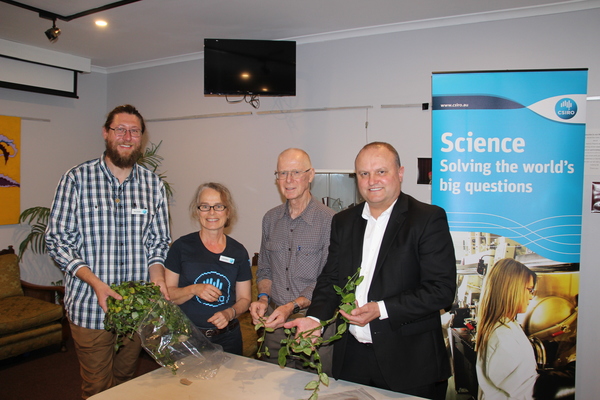The Dandenong Ranges has been selected as the first battleground in a CSIRO-led fight to save rainforests across Australia from a devastating weed known as Wandering Trad.
Local community groups have been battling this invasion for many years and it was an excited group that gathered in Emerald on Friday 23 March to hear the good news.
The CSIRO has been involved in research on Wandering Trad biocontrol since 2014 and field biologist Dr Ben Gooden is coordinating the rollout of the biocontrol program across Australia.
He said that highly targeted and tested biocontrol agents are a more environmentally sustainable option than other available tools.
“Currently, the only tools available to the community and local councils against the weed are hand-pulling and chemical herbicides, which only bring short-term control and have the unintended consequence of killing native plants and disrupting complex rainforest ecosystems.”
Speaking at the announcement, Member for La Trobe, Jason Wood, said that without the work of the community groups getting to this point would not have been possible.
“It’s great to come along and be involved in the announcement considering how many years it has taken us to get here,” he said. “For me this is one of those days I didn’t think would ever come.”
“Over the last five or six years I have pushed the federal government to put in over $6m supporting environment groups for weed control in the area and that’s made a huge difference, but it needs science to come in and support that.”
“The scientists at the CSIRO are so passionate and their tenacity is amazing,” he said. “Their attitude is that if you give us the funding we will dedicate our heart and souls to find the solution.”
Bill Incoll is a committee member of the Community Weed Alliance of the Dandenongs and said he had been looking forward to this day for years.
“Six years ago community groups in the Dandenongs started agitating for biological control of Wandering Trad ,” he said. “Because it was so successful at coming back from any treatments we applied we decided the only response likely to be successful was biological control, which we knew was being used in New Zealand.”
Bill said achieving this outcome was also an opportunity to celebrate the way the various bodies had worked together, including local environment groups and networks, responsible state agencies and the federal government.
“I want to thank all of these actors for their work on behalf of our poor struggling environment,” he said.







